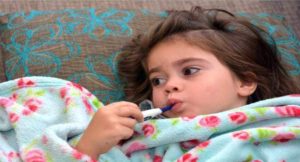
The rainy season tends to bring that much-needed respite from the gruelling heat of summer, but it also raises the risk of water, food, and mosquito-borne diseases. As monsoon has collided with the Covid pandemic this year, people should be more cautious to avoid getting sick. This rainy season brings with it its own share of health issues in children that parents have to watch out for. The sudden drop in temperature, higher humidity, and stagnant water after the rains lead to air, water, and mosquito-borne illnesses, which affect children of all ages.
Parents need to be aware of the preventive measures to keep their children safe from monsoon-related illnesses and warning signs in children to seek timely intervention. Here, experts tell us how to keep children safe during monsoons.
Symptoms and treatment of monsoon-related diseases
Mosquito-borne diseases like dengue, malaria, and chikungunya are associated with high fever, severe body pain, rashes, vomiting, and abdominal pain. Treatment is adequate fluid intake and rest. “Severe symptoms like abdominal pain, persistent vomiting, lethargy, and bleeding that occur in dengue require immediate medical attention,” said Dr. Prashant Moralwar, Consultant Paediatrician, Motherhood Hospital Kharghar, Mumbai.
Food and water-borne diseases are seen in children due to increased breeding of houseflies during monsoons causing contamination of water and food items. Diseases like typhoid, hepatitis, diarrhoea, dysentery, and worm infestations occur due to contaminated food and water. They can lead to fever and abdominal pain while dysentery leads to abdominal cramping and passage of blood in the stool.
“Antibiotics are given to treat typhoid and dysentery along with a healthy diet and hydration. These food and water-borne diseases also cause dehydration in infants and even toddlers. Hence ORS and other liquids like dal water, buttermilk can be advised,” stated Dr. Moralwar.
Common colds and flu caused by viruses are accompanied by fatigue, fever, and body ache and generally last for less than a week. The doctor suggested that a child who is down with flu should be given warm liquids like soup and should rest enough. He/she should not come in close contact with other children. Washing hands frequently and covering the mouth and nose while coughing or sneezing is the need of the hour.
Allergies and asthmatic conditions in children during monsoons are due to increased humidity, fungus growth, and pollen in the environment, he said.
Tips to prevent monsoon-related illnesses
Dr Ankit Gupta Lead Paediatric Critical care specialist, Wockhardt Hospital Mira Road, Mumbai said that parents should ensure their children’s diet is loaded with fruits, milk, eggs, and nuts to enhance their immunity.
“Fruits and vegetables should be washed properly before eating and drinking water should be boiled or RO/UV. Avoid spicy and sugary foods, especially street food, and stick to home-cooked food,” he stated.
He also wants parents to be aware of a few preventive measures such as:
Make sure your child washes his/her hands before eating and after using the toilet.
A warm shower after getting drenched in the rain can help the child get rid of germs.
Avoid visiting crowded places to reduce the risk of viral infections.
Do not touch your nose and mouth with your hand without washing them.
Ensure that your child wears full-sleeved clothes while stepping out, uses mosquito repellents and sprays to prevent mosquito bites.
Wear proper footwear in the rains and wash your feet after walking in flooded areas.
Regularly wash and change bed sheets, blankets, and other household items to prevent allergens.
Dengue mosquitoes breed in stagnated clear water so ensure that water doesn’t accumulate in coolers, flowerpots, or near the house.
Consult a paediatrician in case your child has symptoms like vomiting, lethargy, abdominal pain, or decreased urine frequency. Vaccination is recommended against flu, the doctor noted.




 Driving Naari Programme launched in Chandigarh
Driving Naari Programme launched in Chandigarh






























